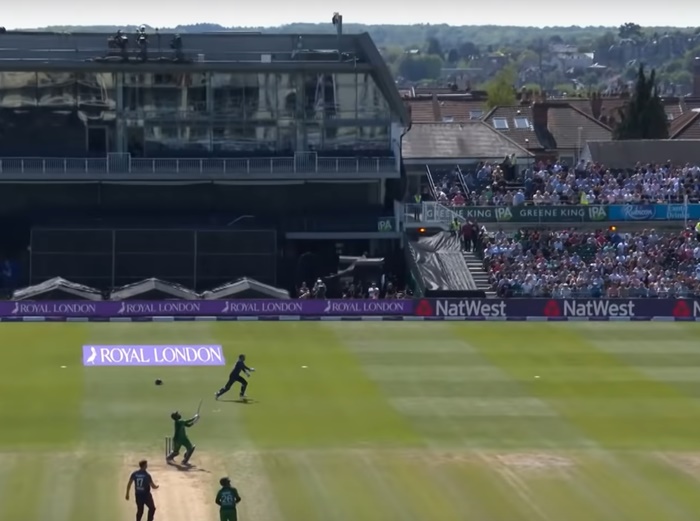
England and Pakistan are warming up for the World Cup. In the third match of the series, Pakistan batted first.
They started off scoring at a run a ball, then picked it up to almost seven an over through the middle phase of their innings, then lifted that again to 9.4 an over for the final ten overs.
“What a beautifully-paced innings,” said someone who still doesn’t get it.
“Well that was a massively inefficient way of going about things,” said England.
England’s view is that if you’re scoring 9.4 an over at the end, then it’s clearly an eight-or-nine-an-over pitch. If you’re not scoring at that rate from the start, you’re basically pissing away runs.
One-day cricket in England is increasingly a game of ensuring you fully cash in with the bat. In the last four years, the average run-rate has been over a run a ball.
That’s par.
A run-a-ball is par.
It’s not enough to cash in. You have to fully cash in. You have to cash in more than the other guys do. That’s the game now.
England start hitting early and they keep on hitting throughout their innings. It is a very specific skill and they are probably as good at it as any one-day side has ever been. They are built for it. Whether they actually make use of their all-rounders or not, the long batting line-up effectively supercharges the top order.
They also have another key and hugely undervalued ingredient, which is a bowling attack that doesn’t generally become dispirited when the opposition appear to be taking them to the cleaners.
Bowling in one-day cricket involves a great many trips to the cleaners, but just because you’re familiar with the route, it doesn’t mean you have to stride to your destination willingly. You can still put up a struggle.
They get a bad rap, England’s one-day bowlers, but this is largely because of ingrained perception. People think 350 is always a spectacular score and that the bowlers who have surrendered such a total have, by definition, performed dreadfully.
This is not true. Sometimes 350 is a spectacular score, but sometimes it’s a normal score. Sometimes – and it seems a bit mad to type this – but sometimes it’s not actually a particularly good score at all.
England often play on pitches where the only real impediment to run-scoring is your own ambition. On days like that, maybe conceding seven an over’s good. Maybe it’s match-winning.
England’s bowlers are good because they usually find a way. They change the angle, they change the length, they change the pace and usually someone or other gets a wicket.
And when they don’t, they just do what they can do. They try and turn the sixes into fours, and the fours into twos, and the twos into singles. No-one’s ever going to give them any real credit for this when their bat-wielding team-mates are having such unignorably obvious fun. But it matters. It matters a lot.
England’s bowlers are very good at a job that no-one properly values.



England are definitely among the favourites to win the World Cup this time around. The knockout rounds are always tricky, but anything less than semi finals will be a disappointment for this side.
Also, https://www.bbc.co.uk/sport/cricket/48030050. Would you pick any batsmen that aren’t in the current team? Only one I picked was KP.
Here’s what I picked: https://ranked-list-images.files.bbci.co.uk/PickYourAll-TimeEnglandODIXI-b3f13c55454019eabc47687913869ac8.html
The team has serious firepower all the way down to 9, and 4-9 can pretty much come in to bat in whatever order you want. You could toss a coin every time a wicket fell.
Plunkett over Anderson because left arm, but you could as easily have Anderson in instead. Gough because he’s ace 🙂
Think you’re asking a lot of Plunkett to change handedness to improve your side.
Shows how much I’ve followed Plunkett’s career 🙂
I agree with all that.
But, referring back to your headline, why can’t I think likewise AND be living in the past?
That’s what I want to do.
And I really don’t see why you should try to stop me from living in the past, just because I think likewise.
This is a good point. We retract that element.
Thanks, KC. In which case I offer you the quintessential living in the past ODI (indeed World Cup) scorecard from 7 June 1975
http://www.espncricinfo.com/series/8039/scorecard/65035/england-vs-india-1st-match-prudential-world-cup-1975
For those who cannot be bothered to click through – England 334/4 – a creditable achievement in those days, albeit with 60 overs to play with rather than the modern 50 over game.
India, in reply, 132/3 in 60 overs. You will need to click through to examine England’s wonderful bowling figures, but the key stat from that innings is that of Sunil Gavaskar who carried his bat: 36 runs in 174 balls, 1 four, no sixes.
Sunil Gavaskar.
I like sixes as much as the next man. But give me 120 all out plays 121-8 any day over these run-fests.
Where does it go from here? What is the maximum team score? Will we eventually see a re-balancing to bowler-friendly conditions? One ball, smaller bats, greener pitches and bigger boundaries?
We’d argue that the whole point of cricket is that you might get either.
Yes. But I would argue we’re seeing more big scores, because pitches are flatter and bats are bigger etc, as it suits the money men.
Are you playing devil’s advocate here, we can’t tell?
You’re probably right that there are more big scores, if only because the range of scores has significantly extended in that direction. But England struggled to chase 199 against Ireland and set the Windies 114 to win in the match before that.
In Sri Lanka, two of the three first innings that lasted 50 overs were under 300.
To a certain degree, we just remember the big scores because they’re the ones that (still) generate all the media noise. Yes, England scored 481-6 against Australia last summer, but the other first innings scores in that series were 214, 342-8, 310-8 and 205. That seems a pretty even spread to us.
You can prove anything with facts